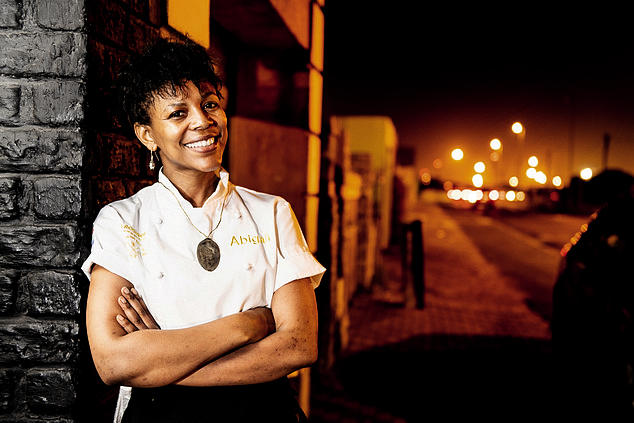
Abigail Mbalo’s Xhosa-inspired fine-dining establishment in Khayelitsha is one of many inspiring stories luring visitors to South Africa’s townships
Watch the accompanying campaign video here
“Before I feed you, I want to show you somewhere. Quick, let’s go!” says Abigail Mbalo, jogging out of her restaurant, 4Roomed eKasi Culture, and hopping into my car before I’ve even switched off the engine. She directs me through the streets of the township she grew up in. This is Khayelitsha, on the periphery of Cape Town. The sun’s setting on a Friday night; locals are parked up, playing music from their car speakers. We pass lively shisa nyama barbecues, and children shrieking with joy as they play games on the pavement. “One of the biggest misconceptions about South Africa is that you mustn’t go to the town-ships because they’re unsafe. That’s so wrong!” says Abigail as we leave the car and stride up the steps of Lookout Hill. From the top, we watch the last of the sun’s rays fall behind Table Mountain in the distance as lights flicker on across the township.
“As a traveller, you’d pass this by. You wouldn’t think so much beauty lies inside Khayelitsha,” she sighs. “We’re working hard to change people’s expectations.” After a star turn on series three of me. “Come on, let’s go back to 4Roomed. I’m excited to cook for you.” Abigail’s fine-dining restaurant, named after the standard township four-room home she grew up in, is a beautiful arrangement of upcycled antiques, eclectic furniture, ferns and fairy lights. I settle into my chair and prepare to feast.
Abigail and her team ply me with botanical virgin cocktails and plate after plate of gorgeous food. To my palate, everything is exotic and new. There’s isonka samanzi steamed bread; umngqusho, which is coconut cream-soaked samp (corn meal); mouth-watering mleqwa chicken slow-cooked with fennel; and plenty of curries, meats and salads. But, Abigail says, for anyone who grew up in an township, dining at 4Roomed should be a trip down memory lane. “With our cuisine, we want to tellMasterChef South Africa, Abigail gave up her career as a dental technician and moved her family back to the township where she’d spent her youth. “I wanted to be a role model and to invest in and develop this space,” she tells stories about growing up in neighbourhoods like this,” she explains.
Pudding is dished up with a personal story. It’s clearly an embarrassing one as Abigail starts giggling so much that one of her chefs has to come out of the kitchen to finish the story. “We’ve made our take on amakhekhe, a township scone with chocolate and citrus. And these,” he says, presenting a tray of caramelised sugar swirls in the shape of a ‘4’, “are to remind us of the sugar Abigail burnt on MasterChef that got her eliminated!” Still chuckling, Abigail joins me for dessert. “That’s one of the things about us South Africans. Be it a township upbringing or a television appearance, we’ll always have hope, because we extract the good from our past.”











